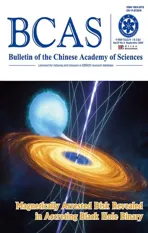The Epigenetic “Dance” of Cell Divisions
2023-11-15ByYANFusheng
By YAN Fusheng
The tango of life begins with the very first cell division.New research reveals that to dance their way through development, dividing cells must pass along not just DNA but molecular “memories” that guide their destinies.When this handoff gets fumbled, the dance falls apart.

Perturbation of symmetric histone inheritance during DNA replication in embryonic stem cells negatively affects their differentiation capacity.(Image by Nature Genetics)
When cells divide, they must pass along their DNA instructions to new daughter cells;but DNA alone doesn’t determine a cell’s identity and function.Cells also inherit regulatory proteins called histones, proteins that help wrapping up DNA strands into ‘bead-like’ structure and controlling which genes are “on” or “off.”
In the September 4 issue ofNature Genetics, a new study reveals that to develop properly, dividing cells must precisely share these identity-determining histones.When this process gets disrupted, cells fail to mature into specialized cell types.
Scientists led by Dr.GAN Haiyun from the CAS Shenzhen Institute of Advanced Technology (SIAT)studied mouse stem cells, which can change into any cell type in the body.Using gene editing, they disabled a protein called Mcm2 that helps evenly separate histones into new cells.
With Mcm2 broken, cells divided but inherited an imbalanced share of histones.This prevented the stem cells from properly transitioning into mature cell types like neurons.
Beyond cells growing askew in laboratory dishes,the edited mouse embryos failed to develop past just four cells.This showed that evenly inheriting histones is crucial, starting from the very first cell divisions.
The results revealed that molecular “memories” of gene activity must be precisely passed down for stem cells to become specialized and for embryos to develop.Disrupting this delicate process causes cells to stumble in their maturation.
These findings uncover new complexities in how cells inherit not just DNA but also the regulatory factors that shape their identities.This epigenetic “dance” of cell division orchestrates embryo development and cellular specialization.When the dance gets fouled up, life goes awry.
“This study rich the conclusions: the epigenetic inheritance of histone modifications is involved in the proper establishment of new cell identities, demonstrating that epigenetic control is not a mere mechanism stabilizing established cell states.Rather, it strongly contributes to the dynamic changes of cell fate required for development,”commented Dr.Pablo Navarro fromUniversité Paris Cité,who is not involved in this study.
Further exploring these intricate molecular handoffs may promise new insights into development, aging, and disease.
杂志排行
Bulletin of the Chinese Academy of Sciences的其它文章
- Could Gut Bacteria Hold a Cure for Sepsis?
- Looking into the Tissue Adjacent to Tumors
- Daya Bay Collaboration Awarded 2023 High Energy and Particle Physics Prize by European Physical Society
- Largest Optical Time-domain Survey Telescope in Northern Hemisphere Goes into Operation
- CAS Paleogeneticist Awarded UNESCO Prize
- “Magnetically Arrested Disk”Revealed by Multiwavelength Observation
